Summers to step down as president at end of academic year
Bok agrees to serve as interim president starting July 1
Bok agrees to serve as interim president starting July 1
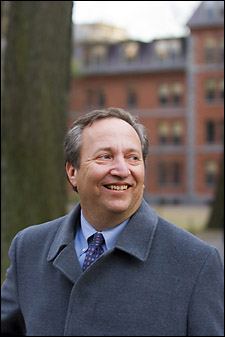
Lawrence H. Summers announced today that he will conclude his tenure as president of Harvard University at the end of the 2005-06 academic year.
Since his appointment five years ago, Summers has spurred attention to renewing the undergraduate experience, guided the launch of innovative interdisciplinary initiatives in the sciences and beyond, and strongly expanded Harvard’s international agenda. Under his leadership, the University has reached out to many more undergraduates from low-income families and also strengthened financial aid for graduate and professional students pursuing careers in public service. During his presidency, Harvard has achieved dramatic faculty growth, undertaken major investments in an array of new facilities, and taken the first concrete steps toward building Harvard’s extended campus in Allston.
“Harvard’s greatness has always come from its ability to evolve as the world and its demands change – to educate and draw forth the energy of each successive generation in new and creative ways,” said Summers. “Believing deeply that complacency is among the greatest risks facing Harvard, I have sought for the last five years to prod and challenge the University to reach for the most ambitious goals in creative ways. As I leave the presidency, my greatest hope is that the University will build on the important elements of renewal that we have begun over the last several years.”
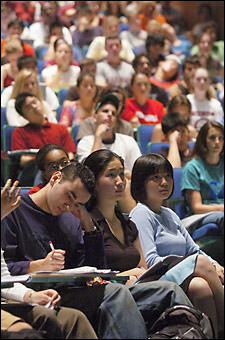
“Since his appointment five years ago, Larry Summers has served Harvard with extraordinary vision and vitality,” said the Fellows of Harvard College, members of the University’s executive governing board, the Harvard Corporation, in a letter to the Harvard community. “He has brought to the leadership of the University a sense of bold aspiration and initiative, a prodigious intelligence, and an insistent devotion to maximizing Harvard’s contributions to the realm of ideas and to the larger world. Through his tenure as president, Harvard has both invigorated its academic programs and engaged more keenly with the complex challenges facing society. Harvard’s paths forward will long bear the imprint of his vision.
“While this past year has been a difficult and sometimes wrenching one in the life of the University,” the Fellows continued, “we look back on the past five years with appreciation for all that has been accomplished and for the charting of an ambitious forward course. We look ahead with confidence in the capacity of our faculty, students, staff, and alumni to embrace a future full of possibility and opportunity. Whatever our differences in perspective, and wherever we study or work within the University, all of us share a commitment to the progress of an institution whose aims are noble, whose traditions are strong, whose spirit is always restless, and whose promise – as embodied in the thousands of men and women who form the Harvard community – knows no bounds.”
Derek Bok, Harvard’s president from 1971 to 1991, has agreed to the Corporation’s request that he serve as interim president of the University from July 1 until the conclusion of the search for a new president, which the Fellows said would begin promptly.
“I will do my best to carry out the Corporation’s request,” said Bok. “There is no institution I care about more deeply, and I will make every effort to work with colleagues to further the University’s agenda during this transitional period.”
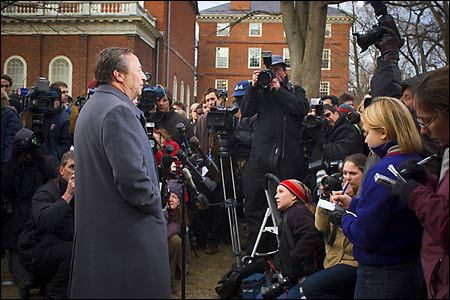
Following an expected year-long sabbatical, Summers plans to return to the faculty to pursue his distinguished academic career in economics, public policy, and international affairs. The Fellows’ letter said that the Corporation intends to appoint Summers as one of Harvard’s select group of University Professors.
“From the day he took office, Larry Summers has worked tirelessly to provide Harvard students, particularly its undergraduates, with the best education possible,” said Patti B. Saris, president of the Board of Overseers. “He has committed himself to strengthening Harvard’s place as a world leader in the sciences, expanding its borders not only into Allston but internationally, and ensuring that Harvard is a place that all students can afford. Harvard has benefited from his energy and out-of-the-box thinking, and will no doubt continue to do so when President Summers again becomes Professor Summers.”
* * *
Summers’ presidency has been marked by an ambitious agenda of growth and change across Harvard.
The Undergraduate Experience
Summers began his presidency by calling for systematic attention to the quality of the undergraduate experience at Harvard. Beginning in 2002, the Faculty of Arts and Sciences undertook the first comprehensive review in a generation of the undergraduate curriculum. While broad-based proposals for curricular reform remain to be decided, the College has already achieved notable progress in a number of areas:
- Opportunities for small-group instruction have increased markedly. The number of freshman seminars (small, discussion-based courses of no more than 14 students) has risen from 34 in 1998-99 (including less than one-quarter of the freshman class) to at least 141 this year – enough to accommodate almost the entire class. Small seminars in large departments such as History and Government are being taught by senior faculty for junior concentrators.
- A new year-long introductory course sequence, Life Sciences 1a and 1b, developed by the Life Sciences Education Committee, integrates materials from five departments, reflecting the increasingly interdisciplinary nature of the life sciences. And faculty in a number of other areas have ambitious plans for new introductory courses.
- Faculty committees reviewing the curriculum have proposed a number of changes to give students more flexibility both in choosing concentrations and in fulfilling general education requirements, and they have recommended strengthening the advising system to support this greater degree of flexibility.
- Many more students are studying or working abroad during their undergraduate years. The number of students who study abroad as part of their college experience has more than doubled, from 164 in 2001-02 to 451 in 2004-05. A comparable number do research, internships, or volunteer work abroad – a total of 482 in the summer of 2005. Thus, over half of Harvard undergraduates are choosing to pursue a significant international experience as part of their Harvard education.
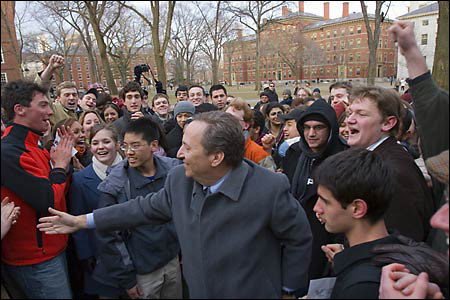
After making a brief statement in the Yard on Feb. 21, Summers greets a crowd of cheering students. (Staff photo Stephanie Mitchell/Harvard News Office) Financial Aid and Public Service
From the beginning of his presidency, Summers has placed a strong emphasis on financial aid and affordability at Harvard and on the importance of higher education as an engine of opportunity nationally. He has worked to extend to all parts of the University the promise that talent, and not ability to pay, should be the key to a Harvard education. In 2004, he announced a major initiative providing that families with incomes less than $40,000 a year are no longer expected to contribute to the cost of their children’s undergraduate education, and that the contribution has been reduced for families with annual incomes up to $60,000. This program has significantly increased the economic diversity of the student body in the College.
Summers has extended the same philosophy to Harvard’s graduate and professional schools through a series of initiatives designed to support students pursuing careers that do not promise large financial rewards:
- The Presidential Scholars Program, established in 2003, has to date funded over 200 top students across the University choosing academic and public service careers. The initial commitment of $15 million has recently been extended to students entering from 2006 through 2009.
- The Zuckerman Fellows Program, established in 2004, and the Catherine B. Reynolds Foundation Fellowships in Social Entrepreneurship, established in 2005, fund outstanding students pursuing careers in the public sector and social entrepreneurship.
- The Harvard Education Loan Program (HELP), established in 2003, makes loans available to all graduate and professional school students, domestic or international, at subprime interest rates up to the cost of attendance at any one of Harvard’s schools.
Faculty Growth, Diversity
Faculty growth has been a key priority, particularly within the Faculty of Arts and Sciences, which has enlarged its faculty at an extraordinary pace during the past several years, and has plans for continued growth. The expansion of the faculty has been accompanied by purposeful efforts to assure junior faculty members a greater prospect of promotion to tenure. In addition, following the work of task forces convened early in 2005, the University has undertaken measures to enhance the gender and racial diversity of the faculty, including the appointment of Professor Evelynn Hammonds as Harvard’s first-ever Senior Vice Provost for Faculty Development and Diversity.
Science and Technology
Together with Provost Steven E. Hyman and key deans and faculty members, Summers has helped propel and support ambitious new investments in science and technology, including the construction of major new laboratory facilities in Cambridge and the Longwood Medical Area, as well as plans for a state-of-the-art science complex in Allston. These investments have helped set the stage for a range of innovative scientific ventures, some already under way, others being planned. They include, among others:
- the Harvard Stem Cell Institute, a leading force in one of the most dynamic areas of science;
- the Broad Institute, joining Harvard with MIT and several Harvard-affiliated hospitals in harnessing the power of genomics to transform clinical medicine;
- the rise of “systems biology,” with a new department at Harvard Medical School and a new initiative in the FAS exploring how the properties of complex biological systems arise from interactions among their parts;
- the FAS Center for Neuroscience, which along with the HMS Department of Neurobiology is probing the science of the brain to explain human cognition and behavior;
- the Harvard Initiative for Global Health, a multidisciplinary effort to address challenges ranging from combating the spread of infectious diseases to developing more sophisticated metrics of population health to understanding the demography of aging.
Culture
During Summers’ tenure, Harvard has also pursued significant investments in culture, humanities, and the arts. These range from completing the renovation of Widener Library to launching ambitious efforts to digitize portions of Harvard’s vast library collections, from enhancing support for Harvard’s Humanities Center to funding the growth of Islamic studies, from planning the renovation of the Fogg Museum to calling for a major cultural complex in Allston.
International
Harvard has expanded its international reach, with notable new initiatives in both African and South Asian studies now complementing the University’s existing array of area studies centers. Scholarship and education across Harvard’s schools have taken on increasingly international dimensions; the Schools have intensified their recruitment and augmented their funding of outstanding students from around the globe; various parts of Harvard have opened research centers on several different continents; and students at all levels have taken greater advantage of opportunities to study abroad.
Allston
The University has also taken major steps to plan its expansion in the Allston section of Boston and has announced the first building site for science as well as initial plans for culture and the arts. Harvard is considering additional major new facilities for science and the potential relocation of the Schools of Education and Public Health, substantial new space for culture and the arts, new residences for both graduate and undergraduate students, and a mix of restaurants, shops, and public spaces designed to enliven the campus and the surrounding community. These options have been developed through a comprehensive planning process, begun in 2003 and still under way.
University Resources
University fundraising totals since 2001 have been robust and growing, with receipts amounting to more than $2 billion for the four years ending June 30, 2005. Meanwhile, Harvard has increased financial transparency across the University and realized financial and operational efficiencies in matters ranging from purchasing to budgeting to human resources to the raising of funds. These administrative and financial improvements have freed up funds for academic uses across the University.
* * *
Lawrence H. Summers took office as the 27th president of Harvard University on July 1, 2001. An eminent scholar and admired public servant, he was the Nathaniel Ropes Professor of Political Economy at Harvard before serving from 1991 to 2001 in a series of senior public policy positions, culminating in his service as secretary of the treasury of the United States.
Having received a bachelor of science degree from the Massachusetts Institute of Technology in 1975, Summers began his Harvard career as a doctoral student in economics. He served, among other roles, as a resident tutor in Lowell House and a teaching fellow for Ec 10, the popular undergraduate economics survey course. After completing his dissertation, “An Asset-Price Approach to Capital Income Taxation,” he was awarded the PhD from Harvard in 1982. By that time, he had taught for three years as an economics faculty member at MIT, where he was named assistant professor in 1979 and associate professor in 1982. He then went to Washington as a domestic policy economist for the President’s Council of Economic Advisers.
In 1983, he returned to Harvard as a professor of economics, one of the youngest individuals in recent history to be named as a tenured member of the University’s faculty. In 1987, he was named Nathaniel Ropes Professor of Political Economy. While on the faculty, he taught undergraduate and graduate courses in macroeconomics and public finance and was an adviser to numerous graduate students who have themselves gone on to become leading economists. He also served as an editor of the Quarterly Journal of Economics.
Summers took leave from Harvard in 1991 to return to Washington, this time as vice president of development economics and chief economist of the World Bank. In 1993, he was named as the nation’s undersecretary of the treasury for international affairs. He had broad responsibility for assisting then-Secretary Lloyd M. Bentsen in formulating and executing international economic policies. In 1995, then-Secretary Robert E. Rubin AB ’60 promoted Summers to the department’s number-two post, deputy secretary of the treasury, in which he played a central role in a broad array of economic, financial, and tax matters, both international and domestic.
On July 2, 1999, Summers was confirmed by the Senate as secretary of the treasury. In that capacity, he served as the principal economic adviser to the President and as the chief financial officer of the U.S. government, presiding over a federal department comprising some two dozen distinct bureaus and offices, with a civilian workforce of nearly 150,000 employees. At the end of his term, he was awarded the Alexander Hamilton Medal, the treasury department’s highest honor.
After leaving the treasury department in January 2001, Summers served as the Arthur Okun Distinguished Fellow in Economics, Globalization, and Governance at the Brookings Institution in Washington. His many publications include Understanding Unemployment (1990) and Reform in Eastern Europe (1991, coauthored with others), as well as more than 100 articles in professional economics journals. He also edited the series Tax Policy and the Economy.
In 1987, Summers became the first social scientist ever to receive the annual Alan T. Waterman Award of the National Science Foundation (NSF), established by Congress to honor an exceptional young U.S. scientist or engineer whose work demonstrates originality, innovation, and a significant impact within one’s field. In 1993, he was awarded the John Bates Clark Medal, given every two years to the outstanding American economist under the age of 40. He was elected to the National Academy of Sciences in 2002.
* * *
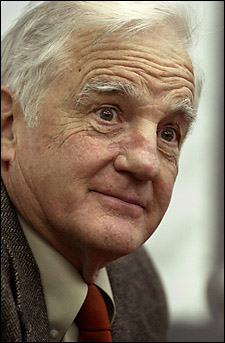
Bok Derek Bok served as the 25th president of Harvard University from 1971 to 1991. He went on to serve from 1991 to 2003 as Harvard’s 300th Anniversary University Professor. He is currently the faculty chair of Harvard’s Hauser Center for Nonprofit Organizations. He also chairs the board of the Spencer Foundation and recently announced his intention to step down after eight years as chair of Common Cause. He has written six books on higher education: Beyond the Ivory Tower (1982), Higher Learning (1986), Universities and the Future of America (1990), The Shape of the River (1998, with William G. Bowen), Universities in the Marketplace (2003), and Our Underachieving Colleges: A Candid Look at How Much Students Learn and Why They Should Be Learning More (2005). He has also written two books about the capacity of the United States government to cope with the nation’s domestic problems: The State of the Nation (1997) and The Trouble with Government (2001). A graduate of Stanford University and Harvard Law School, with a master’s degree in economics from George Washington University, he was a professor of law and then dean of Harvard Law School before becoming Harvard’s president in 1971.




